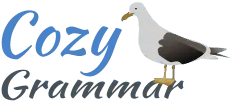
This month we wanted to offer two short video excerpts on adverbs. The topic of adverbs can sometimes seem confusing, but as Marie points out in Lesson 15 of The Basic Cozy Grammar Course, adverbs are simply words that describe verbs, adjectives, and other adverbs.
And of these uses, the most important by far is describing verbs. In fact, the word adverb contains the word verb in it, which we can use as a helpful reminder.
Take a peek at Marie's quick and easy explanation of how adverbs describe verbs:
Two Keys and a Caveat
I remember the first time I learned about adverbs in school. My teacher pointed out that adverbs tend to end in LY and that they answer the question HOW an action is being done. With those two keys, I was off and running!
In the glee of understanding how grammar works, however, we can also get carried away, suddenly piling up adverbs everywhere. That's why I devised the following creative writing exercise to help students discover for themselves how many adverbs are too many and how many are just right:
As I've found again and again in my own writing and life, the best way to learn a new concept is to try it out for oneself and learn from one's experience.
slowly, irregularly, meditatively
Of course, for every rule there is a notable exception.
If it's true that it's often more effective to use fewer well chosen adverbs rather than too many haphazardly chosen ones, that doesn't mean it's not possible to use several well chosen adverbs. The key, as in all good writing, is learning how to choose well.
Here's my favorite example of how a poet makes excellent use of several adverbs in a row, getting away with it precisely because each of them is exceedingly well chosen. In his poem "Once More," Hayden Carruth describes an autumn in Vermont, paying particular attention to the animals in the woods:
Deer move
heavily in the brush like bears, half drunk
on masty acorns and rotten wild apples.
The pileated woodpecker thumps a dead elm
slowly, irregularly, meditatively.
Here, not only has Carruth captured the feeling of how deer move in late autumn with the adverb heavily, he also describes precisely how a pileated woodpecker pecks an old tree: slowly, irregularly, meditatively.
If you've ever spent any time around woodpeckers, you know how apt each of those words is. And if you haven't spent any time around woodpeckers, then this poet helps give you a vivid picture, so that you feel as if you have in fact spent time around woodpeckers.
Once more by the brook the alder leaves
turn mauve, bronze, violet, beautiful
after the green of crude summer; galled
black stems, pithy, tangled, twist in the
flesh-colored vines of wild cyclamen.
Mist drifts below the mountaintop
in prismatic tatters. The brook is full,
spilling down heavily, loudly, in silver
spate from the beaver ponds in the high
marshy meadows. The year is sinking:
heavily, loudly, beautifully. Deer move
heavily in the brush like bears, half drunk
on masty acorns and rotten wild apples.
The pileated woodpecker thumps a dead elm
slowly, irregularly, meditatively.
Like a broken telephone a cricket rings
without assertion in dead asters and
goldenrod; asters gone cloudy with seed,
goldenrod burnt and blackened. A gray trout
rests under the lip of glacial stone. One
by one the alder leaves plunge down to earth,
veering, and lie there, glowing, like a shirt
of Nessus. My heart in my ribs does what it
has done occasionally all my life: thumps and
heaves suddenly in irregular rhythm that makes
me gasp. How many times has this season turned
and gone down? How many! I move heavily
into the bracken, and the deer stand still
a moment, uncertain, before they break away,
snorting and bounding heavily before me.
Thanks so much for joining us. We'll see you again in December!

Warmly,
Thomas
Marie's Language Consultant
The Cozy Grammar Series of Courses
